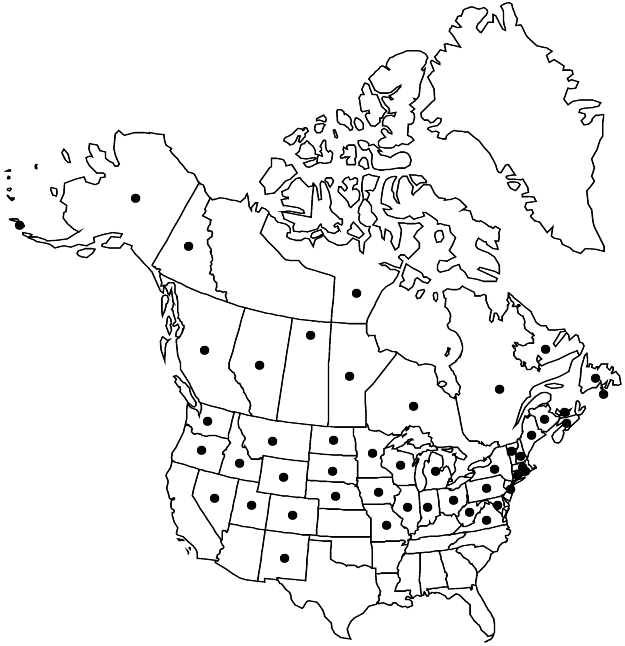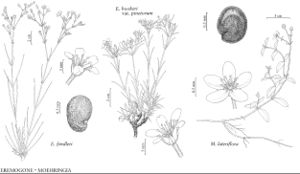Difference between revisions of "Moehringia lateriflora"
Vers. Darstell. Alsin., 18, 38. 1833.
FNA>Volume Importer |
imported>Volume Importer |
||
| (6 intermediate revisions by 2 users not shown) | |||
| Line 8: | Line 8: | ||
}} | }} | ||
|common_names=Grove or blunt-leaf sandwort;moehringie ou sabline latériflore | |common_names=Grove or blunt-leaf sandwort;moehringie ou sabline latériflore | ||
| − | |basionyms={{Treatment/ID/ | + | |special_status={{Treatment/ID/Special_status |
| + | |code=W | ||
| + | |label=Weedy | ||
| + | }}{{Treatment/ID/Special_status | ||
| + | |code=F | ||
| + | |label=Illustrated | ||
| + | }} | ||
| + | |basionyms={{Treatment/ID/Basionym | ||
|name=Arenaria lateriflora | |name=Arenaria lateriflora | ||
|authority=Linnaeus | |authority=Linnaeus | ||
| + | |rank=species | ||
| + | |publication_title=Sp. Pl. | ||
| + | |publication_place=1: 423. 1753 | ||
}} | }} | ||
|synonyms={{Treatment/ID/Synonym | |synonyms={{Treatment/ID/Synonym | ||
|name=Arenaria lateriflora var. angustifolia | |name=Arenaria lateriflora var. angustifolia | ||
|authority=H. St. John | |authority=H. St. John | ||
| − | }}{{Treatment/ID/Synonym | + | |rank=variety |
| + | }} {{Treatment/ID/Synonym | ||
|name=Arenaria lateriflora var. taylorae | |name=Arenaria lateriflora var. taylorae | ||
|authority=H. St. John | |authority=H. St. John | ||
| − | }}{{Treatment/ID/Synonym | + | |rank=variety |
| + | }} {{Treatment/ID/Synonym | ||
|name=Arenaria lateriflora var. tenuicaulis | |name=Arenaria lateriflora var. tenuicaulis | ||
|authority=Blankinship | |authority=Blankinship | ||
| + | |rank=variety | ||
}} | }} | ||
|hierarchy=Caryophyllaceae;Caryophyllaceae subfam. Alsinoideae;Moehringia;Moehringia lateriflora | |hierarchy=Caryophyllaceae;Caryophyllaceae subfam. Alsinoideae;Moehringia;Moehringia lateriflora | ||
| Line 36: | Line 49: | ||
|elevation=50-2700 m | |elevation=50-2700 m | ||
|distribution=St. Pierre and Miquelon;Alta.;B.C.;Man.;N.B.;Nfld. and Labr.;N.S.;Nunavut;Ont.;P.E.I.;Que.;Sask.;Yukon;Alaska;Colo.;Conn.;Idaho;Ill.;Ind.;Iowa;Maine;Md.;Mass.;Mich.;Minn.;Mo.;Mont.;Nebr.;Nev.;N.H.;N.J.;N.Mex.;N.Y.;N.Dak.;Ohio;Oreg.;Pa.;R.I.;S.Dak.;Utah;Vt.;Va.;Wash.;W.Va.;Wis.;Wyo.;Europe;Asia. | |distribution=St. Pierre and Miquelon;Alta.;B.C.;Man.;N.B.;Nfld. and Labr.;N.S.;Nunavut;Ont.;P.E.I.;Que.;Sask.;Yukon;Alaska;Colo.;Conn.;Idaho;Ill.;Ind.;Iowa;Maine;Md.;Mass.;Mich.;Minn.;Mo.;Mont.;Nebr.;Nev.;N.H.;N.J.;N.Mex.;N.Y.;N.Dak.;Ohio;Oreg.;Pa.;R.I.;S.Dak.;Utah;Vt.;Va.;Wash.;W.Va.;Wis.;Wyo.;Europe;Asia. | ||
| − | |discussion=<p>Four varieties of Moehringia laterifolia have been described based on variation in leaf width and pubescence; they have been little used, and the variation appears not to be correlated with geography.</p> | + | |discussion=<p>Four varieties of <i>Moehringia</i> laterifolia have been described based on variation in leaf width and pubescence; they have been little used, and the variation appears not to be correlated with geography.</p> |
|tables= | |tables= | ||
|references= | |references= | ||
| Line 45: | Line 58: | ||
-->{{#Taxon: | -->{{#Taxon: | ||
name=Moehringia lateriflora | name=Moehringia lateriflora | ||
| − | |||
|authority=(Linnaeus) Fenzl | |authority=(Linnaeus) Fenzl | ||
|rank=species | |rank=species | ||
| Line 59: | Line 71: | ||
|publication title=Vers. Darstell. Alsin., | |publication title=Vers. Darstell. Alsin., | ||
|publication year=1833 | |publication year=1833 | ||
| − | |special status= | + | |special status=Weedy;Illustrated |
| − | |source xml=https:// | + | |source xml=https://bitbucket.org/aafc-mbb/fna-data-curation/src/2e0870ddd59836b60bcf96646a41e87ea5a5943a/coarse_grained_fna_xml/V5/V5_152.xml |
|subfamily=Caryophyllaceae subfam. Alsinoideae | |subfamily=Caryophyllaceae subfam. Alsinoideae | ||
|genus=Moehringia | |genus=Moehringia | ||
Latest revision as of 22:09, 5 November 2020
Plants perennial. Rhizomes forming extensive network. Stems ascending or decumbent, often branched, terete, 5–30 cm, uniformly retrorsely pubesescent. Leaves sessile or subsessile; petiole 0.1–1 mm; blade 1–3-veined, broadly elliptic to oblong-elliptic or oblanceolate, 6–30(–35) × (2–)5–10(–17) mm, margins granular to minutely serrulate-ciliate, apex obtuse or rounded. Inflorescences 1–5-flowered; bracts 1–3 mm, margins scarious. Pedicels erect, 3–30 mm. Flowers: sepals 5, midrib not keeled, ovate or obovate, herbaceous portion oblong to elliptic, 1.7–2.8(–3) mm, margins narrow, apex mostly obtuse or rounded; petals 5, 3–6 mm, ca. 2 times as long as sepals. Capsules subglobose, 3–5 mm, 11/2–2 times as long as sepals. Seeds reniform, 1 mm, smooth. 2n = 48.
Phenology: Flowering spring–early summer.
Habitat: Moist or dry woodlands, meadows, gravelly shores
Elevation: 50-2700 m
Distribution

St. Pierre and Miquelon, Alta., B.C., Man., N.B., Nfld. and Labr., N.S., Nunavut, Ont., P.E.I., Que., Sask., Yukon, Alaska, Colo., Conn., Idaho, Ill., Ind., Iowa, Maine, Md., Mass., Mich., Minn., Mo., Mont., Nebr., Nev., N.H., N.J., N.Mex., N.Y., N.Dak., Ohio, Oreg., Pa., R.I., S.Dak., Utah, Vt., Va., Wash., W.Va., Wis., Wyo., Europe, Asia.
Discussion
Four varieties of Moehringia laterifolia have been described based on variation in leaf width and pubescence; they have been little used, and the variation appears not to be correlated with geography.
Selected References
None.
